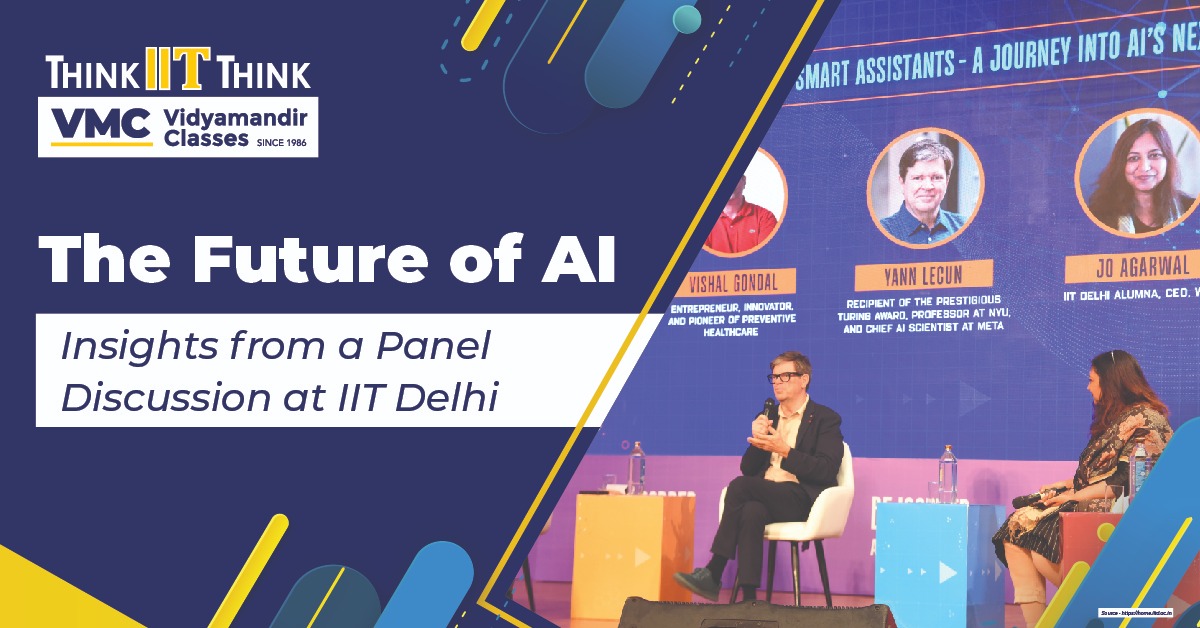The Future of AI: Insights from a Panel Discussion at IIT Delhi
 Posted On
Posted On
121 total views, 2 views today
In a world increasingly shaped by artificial intelligence, the visit of Dr. Yann LeCun, Meta’s Chief AI Scientist, to IIT Delhi on October 24, marked a significant milestone in India’s AI discourse. As one of the foremost visionaries in the field, Dr. LeCun’s contributions to AI have not only shaped modern AI architectures but continue to inspire future innovations. His participation in the panel discussion titled “From Neural Mimics to Smart Assistants – A Journey into AI’s Next Frontiers” sparked thought-provoking discussions on the future of AI, highlighting the need for architectural evolution, open-source AI, and India’s promising role on the global stage.
Rethinking AI Architectures
A cornerstone of Dr. LeCun’s talk was his call to rethink the foundational structures of AI. Current advancements in AI are largely built on large language models (LLMs) that operate on vast amounts of data to generate responses, recognize patterns, and perform a range of tasks. While these models have demonstrated impressive capabilities, Dr. LeCun believes they have inherent limitations that will prevent them from ever reaching true human-like intelligence. His argument was that scaling up existing architectures alone will not lead to significant breakthroughs.
“Making the model bigger isn’t the solution,” he emphasized. Instead, Dr. LeCun advocates for the development of entirely new architectures rooted in “objective-driven” designs. This forward-looking perspective encourages a shift from mere language-based frameworks to systems that can autonomously set and pursue goals, adapt to complex environments, and offer greater contextual understanding. Such architectures, according to Dr. LeCun, hold the promise of producing AI that can reason, learn dynamically, and make decisions in a human-like manner.
The Power of Open-Source AI
Dr. LeCun also touched on the transformative potential of open-source platforms in AI development. The open-source approach has proven to be a vital force in accelerating AI advancements, as it allows a larger pool of developers to access, modify, and enhance AI systems, driving innovation from diverse perspectives. By advocating for an open-source ecosystem, Dr. LeCun signaled the importance of democratizing AI research and development.
Meta’s own open-source projects, such as PyTorch, have revolutionized the AI landscape, providing accessible tools that have become industry standards. Dr. LeCun believes that the advantages of open-source systems lie not only in accelerating technological progress but in fostering a collaborative environment where AI solutions can be refined and expanded upon in ways that proprietary systems cannot. This vision aligns with the ethos of collective problem-solving, where innovations are shared across borders, benefiting humanity at large.
India’s Role in Shaping AI’s Future
Dr. LeCun’s speech also highlighted India’s unique position in the AI ecosystem. He emphasized the country’s potential as a powerhouse in AI development, due to its large population, cultural diversity, and robust technical workforce. India’s demographic diversity offers an unparalleled testing ground for AI models that can adapt to various languages, dialects, and social contexts. As global AI models increasingly seek relevance across different regions, Dr. LeCun noted, India’s contribution in developing culturally nuanced models will be invaluable.
Moreover, Dr. LeCun remarked on the distributed nature of training AI models, noting that India’s scale and technical talent provide an excellent foundation for a cooperative AI development ecosystem. By embracing this collaborative approach, India has the opportunity to shape AI’s trajectory on both local and global levels, potentially spearheading projects that are adaptable, inclusive, and capable of addressing challenges specific to various communities around the world.
Addressing AI Safety Concerns
AI safety and its implications on society have become major topics of concern, often colored by dystopian portrayals in popular media. Dr. LeCun sought to address these fears, asserting that AI is designed to empower rather than dominate humans. “The future of AI, in my opinion, is a future in which everyone will be walking around with an assistant, digitally, like smart glasses,” he said.
This vision reflects a more integrated, practical approach to AI’s role in daily life. Instead of fearing AI as a superintelligence poised to supersede humanity, Dr. LeCun suggested a future where AI functions as a digital assistant, amplifying human potential. Imagine AI that can help individuals with tasks, provide real-time information, and even assist in problem-solving—“like walking around with three smart people working for you,” as he humorously noted. This empowering vision contrasts sharply with narratives that cast AI as a threat to human autonomy, reinforcing AI as a tool for positive human advancement.
IIT Delhi’s Contributions to AI and Healthcare
The event at IIT Delhi underscored the Institute’s commitment to pioneering AI research and exploring its applications in healthcare. In his welcoming address, IIT Delhi Director Prof. Rangan Banerjee shared the Institute’s vision for bridging the gap between human intelligence and AI through research initiatives that tackle real-world challenges. A notable example is the Centre for Healthcare, a collaborative project involving the Government of India, AIIMS, and IIT Delhi, which aims to harness AI’s potential to revolutionize healthcare in India.
This center embodies a growing trend to leverage AI for socially beneficial purposes. By using AI in healthcare, researchers at IIT Delhi are working toward solutions that can improve patient outcomes, optimize treatment processes, and even aid in predictive diagnosis. The Centre for Healthcare exemplifies the potential of AI to serve the public good, addressing some of India’s most pressing healthcare challenges.
Shaping the Next Era of AI Assistants
Dr. LeCun’s discussion of AI assistants offered a glimpse into the practical applications of AI in personal and professional settings. With advancements in AI technologies, the concept of a digital assistant has evolved far beyond simple voice-activated commands. He envisions a world where AI not only assists with information retrieval but actively enhances productivity, creativity, and everyday problem-solving.
Imagine, for instance, an AI assistant that could manage daily tasks, set reminders, provide educational content tailored to individual learning styles, and even offer emotional support when needed. Such AI systems could improve quality of life by alleviating stress, optimizing time management, and providing personalized guidance. The idea of “three smart people” at one’s side is no longer science fiction but a rapidly approaching reality, as research and development in AI accelerate.
The Path Forward
Dr. Yann LeCun’s insights at IIT Delhi emphasized the dynamic landscape of AI, marked by a transition from traditional models to innovative architectures and the importance of collaboration across countries and disciplines. He challenged the current paradigm, advocating for the exploration of new, objective-driven architectures, which could lay the foundation for the next generation of AI capable of emulating human-like intelligence.
His emphasis on India’s role in AI development sheds light on the country’s vast potential, with its technical expertise and cultural diversity positioning it as a key player in AI’s future. The panel discussion underscored how AI can be a tool for empowerment, offering new opportunities for personal and societal growth while dispelling myths of AI dominance.
As AI continues to evolve, so too must our approach, ensuring that it remains a force for good. Dr. LeCun’s vision provides a roadmap for achieving this, inspiring researchers, policymakers, and technologists to push the boundaries of what AI can accomplish. This journey from “Neural Mimics to Smart Assistants” is more than just a technological shift; it’s a call to rethink, reimagine, and reshape the future of intelligence itself. With contributions from institutions like IIT Delhi and visionaries like Dr. LeCun, the future of AI holds exciting possibilities, promising innovations that may one day transform how we live, learn, and work.



